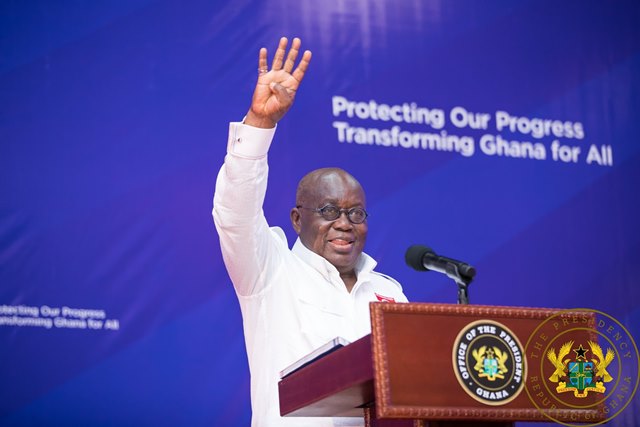|
Getting your Trinity Audio player ready...
|
President Akufo-Addo’s reelection bid has been given a massive boost following the publication of a survey Friday that gives him high marks in the delivery of his 2016 campaign promises.
Akufo-Addo in the run-up to the 2016 general elections made a litany of promises to the Ghanaian people including; free SHS, one district, one factory, planting for food and jobs amongst others.
According to the Ghana Centre for Democratic Development’s (CDD) 2020 pre-election survey data published on Friday, October 30, the “NPP enjoys a significant advantage (15 percentage points) over the NDC when it comes to public confidence in the ability to deliver on campaign promises.”
Again, assessments of the performance of the Akufo-Addo government are broadly positive. It got particularly high grades for its handling of the COVID crisis, electricity, and education.
For instance, the implementation of the free SHS programme had 85 percent approval ratings from Ghanaians, followed by the revamping of the National Health Insurance Scheme, 66 percent, fighting the menace of illegal small scale mining or ‘galamsey,’ 55 percent, one district, one factory, 48 percent and, the one village, one dam, 46 percent.
Also contrary to claims by politicians that the electoral commission lack credibility going into the December 7 general elections, the public expresses broad confidence in the integrity and competence of the EC and its ability to deliver free and fair Election 2020.
“They deem the EC’s level of preparedness, together with other election-related state and non-state agencies (particularly the military and police), adequate. Most importantly, they express broad confidence in the EC and allied bodies’ ability to deliver credible Election 2020,” the survey found.
It continued, “Levels of trust in the EC and other non-party state and non-state bodies directly and indirectly involved in delivering peaceful elections with credible outcomes are generally high, particularly for the military, police, and media. “
However, there is considerable apprehension about violence by party and candidate supporters, according to the survey. “They remain concerned about the activities of party vigilantes – which is underscored by the desire of 8 in 10 respondents in our survey for armed security personnel present at the polling stations.”
Also, there are serious concerns about the integrity of the vote count and result transmission process. A large minority – more than 4 in 10 – express concerns about the wrong vote tally being announced, and about a third are not confident that their vote would be counted (concerns that are far higher than 2016).
“ This is the likely reason why a substantial majority of respondents want to see independent domestic and international observers present for the polls,” the survey found.
Initiated in 2016, the CDD-Ghana pre-election survey is aimed at picking early warning signals by tracking citizens’ opinion on the overall level of the country’s preparedness for elections; public confidence in the competence, integrity, and neutrality of the election-relevant state and quasi-state bodies; and voter behaviour, expectations, priorities, and potential turn-out.
The survey also helps isolate and identify voter concerns regarding election security, physical intimidation, violence, and perceived peacefulness of the political environment. With funding support from USAID/Ghana, CDD-Ghana conducted a pre-election survey from September 28 to October 16, 2020.
Every adult citizen had an equal chance of being selected for 2020 pre-election survey. A nationally representative sample of 2,400 adult citizens were randomly. The sample is distributed across regions and urban-rural areas in proportion to their share in the national adult population. Face-to-face interviews were conducted in the language of the respondent’s choice (a standard English questionnaire was translated into Twi, Ewe, Ga, Dagbani, and Dagaare). Sample size of 2,400 yields a margin of error of +/-2 percentage points at a 95% confidence level. Fieldwork (or data collection) for the 2020 pre-election survey was conducted from September 28 to October 16, 2020.
Source: Daily Mail GH





